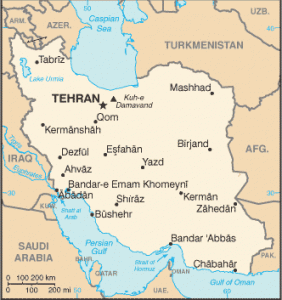As enthusiasm about the negotiations between Iran and the P5+1 begins to peter out, sources close to the talks have revealed that Washington hardened its position during the last round in Moscow, foregoing concrete progress in favor of an all-or-nothing posture.
 In Moscow, the Iranians made a proposal that included agreeing to halt uranium enrichment to 20 percent U-23, the isotope that gives uranium its explosive power, and to a plan to “operationalize” the Supreme Leader’s fatwa against nuclear weapons. This would be in exchange for easing economic sanctions, Iranian inclusion in talks on key regional issues like Syria and Bahrain, and international recognition for Iran’s right to have a peaceful nuclear program.
In Moscow, the Iranians made a proposal that included agreeing to halt uranium enrichment to 20 percent U-23, the isotope that gives uranium its explosive power, and to a plan to “operationalize” the Supreme Leader’s fatwa against nuclear weapons. This would be in exchange for easing economic sanctions, Iranian inclusion in talks on key regional issues like Syria and Bahrain, and international recognition for Iran’s right to have a peaceful nuclear program.
According to officials speaking with Al Monitor, Washington was initially considering incremental steps toward settlement. Any individual concession the Iranians agreed to would be met with reciprocal concessions and benefits.
In the third round of talks in Moscow, however, that changed. Now the West was demanding that Iran meet all three conditions in their proposal: stop 20% enrichment, ship out a stockpile of more than 100 kilograms of 20%-enriched uranium and close the Fordo site, a fortified enrichment facility built into a mountain.
The US refusal to make incremental progress in these talks with Iran indicates a lack of interest in true settlement.
In principle, the talks and the Western aggression against Iran are illegitimate. There is a consensus in the US intelligence community that Iran is not developing nuclear weapons and has demonstrated no intention to do so.
Still, the sanctions and then negotiations were imposed on Iran. But the so-called diplomacy with Iran has been “predicated on intimidation, illegal threats of military action, unilateral ‘crippling’ sanctions, sabotage, and extrajudicial killings of Iran’s brightest minds,” writes Reza Nasri at PBS Frontline’s Tehran Bureau. These postures have spoiled the chance to resolve this issue promptly and respectfully.
After the failed talks in 2009 and 2010, wherein Obama ended up rejecting the very deal he demanded the Iranians accept, as Harvard professor Stephen Walt has written, the Iranian leadership “has good grounds for viewing Obama as inherently untrustworthy.” Former CIA analyst Paul Pillar has concurred, arguing that Iran has “ample reason” to believe, “ultimately the main Western interest is in regime change.”
Since the peaceful nature of Iran’s current nuclear program is so widely accepted, the only real gripe people have is that Tehran is slightly too opaque on the issue (this, despite all declared enrichment sites being subject to international inspections and having 24-hour video surveillance). Any opaqueness Iran has demonstrated, along with its emphasis on being “nuclear capable,” is merely a defensive posture from a regime that fears US or Israeli aggression.
But there is a simple solution to this which would vastly decrease the geopolitical tensions in the region, yet is seen as out of the question by the US. If Israel, Iran’s main adversary and not a NPT signatory, agreed to dismantling its vast stockpiles of nuclear weapons and to a deal enforcing a nuclear weapons-free zone in the Middle East – a deal Iran has repeatedly proposed – Iran’s defensive posture would probably expire, along with the whole dispute about its nuclear program.


